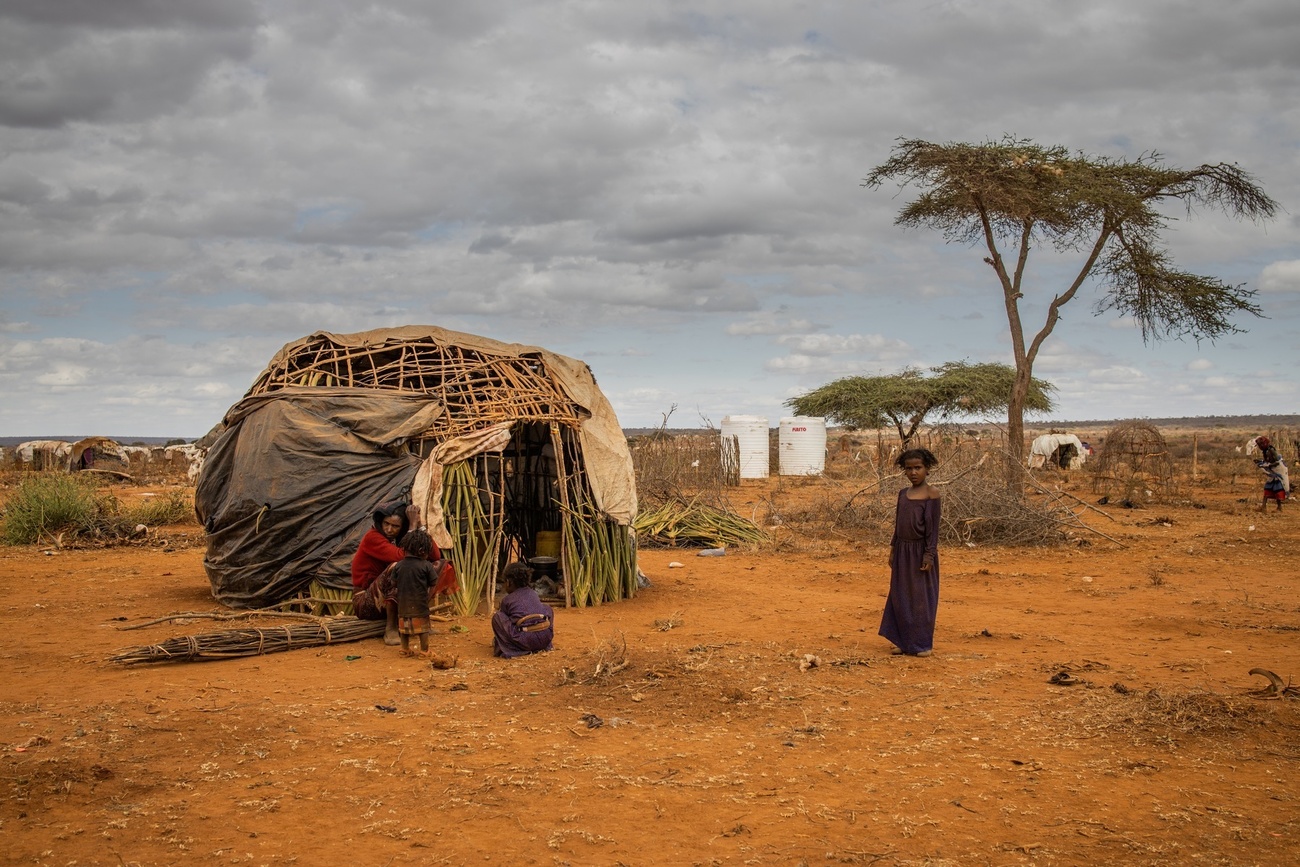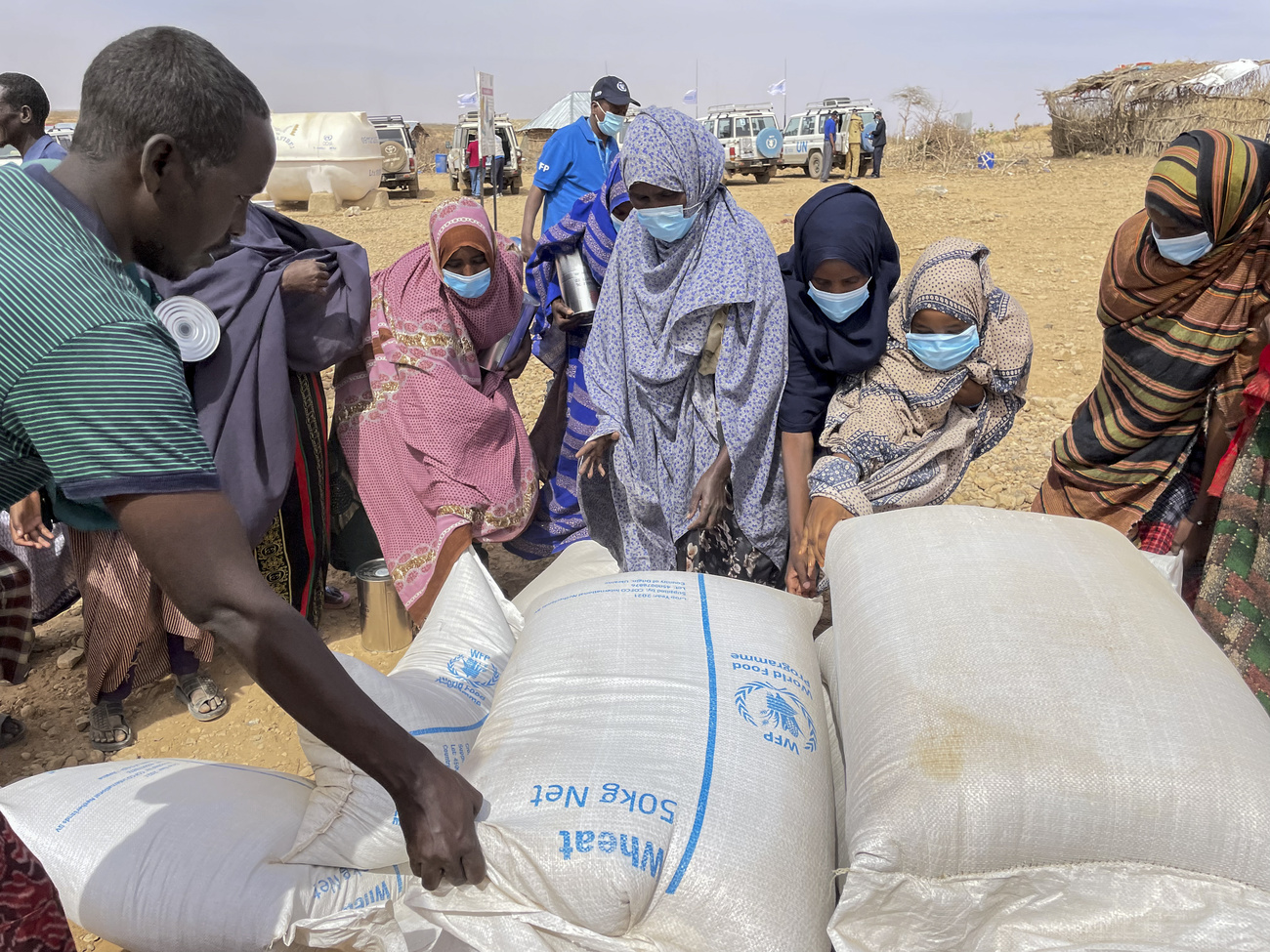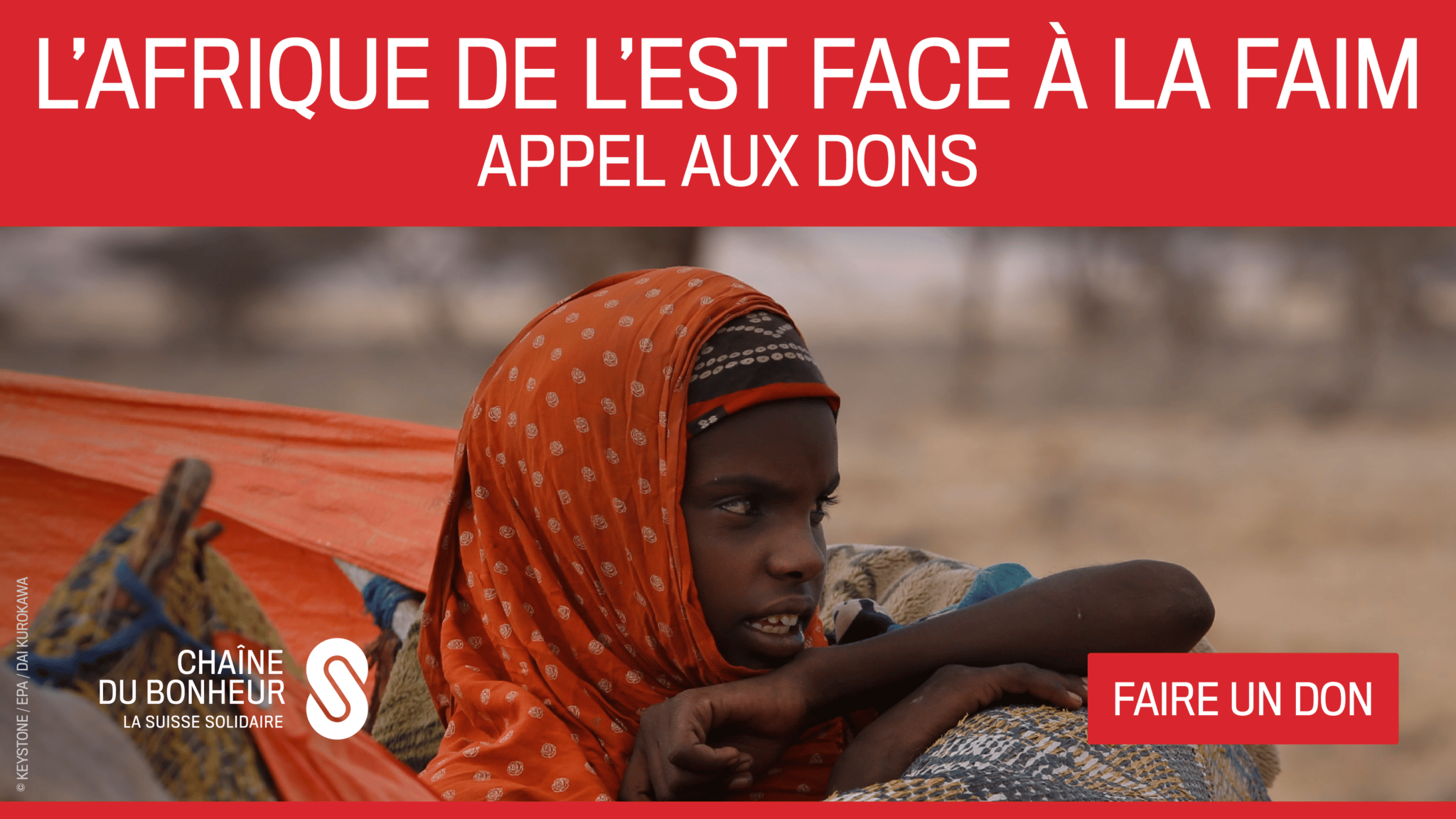
Switzerland urged not to forget the food crisis in East Africa

The Horn of Africa is currently experiencing one of the worst droughts in over 40 years and food prices are soaring. Swiss Solidarity, the humanitarian arm of the Swiss Broadcasting Corporation, is organising a collection day on Wednesday to extend its on-the-spot aid.
The southern part of Ethiopia is one of the areas most affected by the exceptional drought, which is linked to climate change. “It hasn’t rained here at all since 2020; normally there are two rainy seasons a year,” says Amélie Courcaud, coordinator of Swiss Red Cross (SRC) operations in the country.
The consequences are devastating in this naturally arid region, where the population lives on pastoralism. Harvests are failing and herds are being decimated. In the Borena area, where many livestock usually graze, “there’s almost nothing left”, Courcaud says. The local authorities estimate that 87% of livestock have died, which also has a serious impact on milk and meat production. Food is scarcer and therefore more expensive.
“Just over seven million people are in urgent need of food in Ethiopia,” she says. Food insecurity is beginning to affect the health of the population, with more and more cases of severe malnutrition observed among the most vulnerable, such as young children, pregnant women and the elderly. Access to drinking water is even more complicated than usual, leading to cases of cholera.
The effects of the drought are compounded by widespread internal displacement and the fragility of the economy, which has been hit by the Covid pandemic and now by high inflation. Like many African countries, Ethiopia was heavily dependent on Ukraine for grain imports, the price and availability of which has been hampered by the war.

More
How the war in Ukraine is fuelling the next global food crisis
“In February a kilo of wheat was the equivalent of CHF0.50 ($0.53),” Courcaud says. “In June it rose to CHF1.15, and today it’s close to CHF2.” The price of maize, which is needed to feed the animals, has increased by 60%, she adds.
Call for more aid
Humanitarian organisations warn that the situation is critical throughout the Horn of Africa – in Ethiopia but also in Somalia and in Kenya. “It’s a disaster like nothing we have seen in the last 40 years,” warned several heads of UN agencies in a joint statementExternal link earlier this month.
At least 36 million people in the three countries are suffering from the effects of the prolonged drought and nearly 21 million people are highly food insecure, the last stage before famine. “Yet the world’s attention is elsewhere,” the UN officials lament.
Courcaud agrees: “The attention of donors and the general public is focused on the crisis in Ukraine; unfortunately, it’s not only in Ukraine that people are suffering the consequences of war.”
The UN says “the world cannot afford to ignore drought in the Horn of Africa”, calling for a “significant” increase in humanitarian aid. In response to this “forgotten crisis”, Swiss Solidarity, which is already financing various projects on the spot, is launching a fund-raising day in Switzerland on November 23. The humanitarian foundation, which is linked to the Swiss Broadcasting Corporation (SWI swissinfo.ch’s parent company), hopes to give its partner organisations the means to extend their aid.
Donations can be made directly online on the Swiss Solidarity websiteExternal link or to the Swiss Solidarity postal account CH82 0900 0000 1001 5000 6 with the note “Hunger in East Africa”. Since the opening of its account for the African drought in April, Swiss Solidarity has donated over CHF1.8 million to local projects. The aid is being provided by various Swiss NGO partners, including the Red Cross, Helvetas and Caritas.

Financing adaptation and resilience
In Ethiopia the SRC’s project focuses on access to food, drinking water, medicines and hygiene, Courcaud explains.
The SRC distributes water treatment kits but also money directly to around 3,000 families, who are taught how to make the best use of it. The beneficiary families are selected according to several vulnerability criteria such as income level or the presence of dependent people in the household.
“We pay them the equivalent of CHF350 in three instalments,” Courcaud says. With this, they can buy food and hygiene products and cover their basic needs for several months The organisation also fights against the spread of disease by taking care of the incineration of numerous animal corpses, a task that is both crucial and sensitive in a region where people live with their animals.
Courcaud explains that SRC would have the capacity to extend this aid to more people but currently lacks the funding to do so. She adds that with more donations, the humanitarian organisation could go beyond emergency aid, get out of “survival mode” and deploy a longer-term action by helping families to adapt to future crises.
It all began in 1946 in the city of Lausanne on Lake Geneva, on what was then called Radio Sottens, the public radio station of French-speaking Switzerland (now RTS). Host Roger Nordmann and comedian Jack Rollan launched “Chaîne du Bonheur” or Swiss Solidarity, a programme designed to collect donations for humanitarian causes.
The Lausanne-based studio received crates of sausages, mattresses, shoes, toys and even cigars. The Swiss Red Cross was chosen as the first partner to distribute the donations. The idea then spread to other linguistic regions. “Glückskette” started in Basel in 1947 and “La buona azione”, which later became “Catena della Solidarietà”, was born in Lugano in 1948.
Regular appeals via radio broadcasts stopped in the 1950s, but Swiss Solidarity survived and grew. In 1983 it was set up as a separate foundation, while remaining closely linked to the Swiss Broadcasting Corporation, SWI swissinfo.ch’s parent company. Today, Swiss Solidarity’s fundraising appeals are systematically relayed by public media channels, but also by private broadcasters.
The donations collected are distributed among some 20 partner NGOs. The projects focus on long-term projects such as post-disaster reconstruction in Switzerland and elsewhere in the world.
Since its foundation, Swiss Solidarity has organized more than 250 fund-raising events and raised CHF1.7 billion in donations, making it Switzerland’s largest donor of humanitarian aid.
Translated from French by Thomas Stephens

In compliance with the JTI standards
More: SWI swissinfo.ch certified by the Journalism Trust Initiative































You can find an overview of ongoing debates with our journalists here . Please join us!
If you want to start a conversation about a topic raised in this article or want to report factual errors, email us at english@swissinfo.ch.